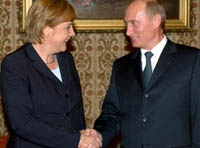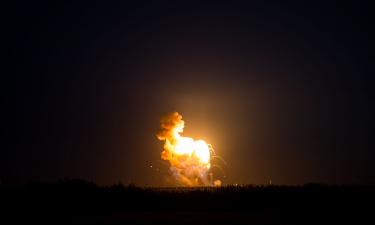Merkel and Putin become friends over pelmeni and bear meat
They’ve managed it: Bundeskanzlerin Angela Merkel and Vladimir Putin have become friends. This is what the German Minister of Finance and Technology Michael Glos declared yesterday when welcoming both leaders at the Russian-German business forum in Tomsk. And he added that this can be viewed as a continuation of the traditional friendship uniting Russian and German leaders from the time of Boris Yeltsin and Helmut Kohl.

Putin and Merkel looked like such an inseparable couple yesterday that they seemed to have been clear friends for a long time. They traveled around Tomsk in one car, Putin’s, and had lunch and dinner together. The day before on Wednesday Putin treated Frau Merkel to Siberian pelmeni for three hours, so they finished their meal well after midnight. They also ate bear meat. Putin publicly admitted this, which could cause certain problems for the Chancellor with the ‘Greens’ at home.
After finishing the official programme of Russian-German consultations, the president and chancellor went “into the people”, going for a stroll along the Tom’ embankment and slightly embarrassing some girls who were also walking there and with whom the VIPs started a spontaneous conversation. Yesterday morning Mrs. Merkel strolled around Tomsk on her own private programme. She visited a Lutheran church which had been set out for her arrival, placed a candle there, took admired the sight of the ice drift on the Tom, which delighted her so much that she even switched into Russian. Then she went to the local Russian-German establishment, where she had some Russian bread and salt which was served up for her, listened to German songs sung by a choir and she patted some children who had come to meet her on the head.
The friendship which has appeared on the national stage was meant to coincide with the relations of strategic partners of which there has been much talk at the business forum. The trade turnover figures achieved between Russia and Germany last year were 33 billion dollars, according to Russian estimates. But the President of the Union of Russian Industrialists Aleksandr Shokhin noted that three quarters of this trade was provided by the export of Russian energy resources.
The idyll in the business circle was only disturbed once, when Frau Merkel asked the Chairman of the Eastern Commission for the German economy Klaus Mangold to relate the problem of German companies gaining access to the development of Russian raw material deposits. At that moment Putin and the head of the Ministry for Economic Development German Gref, who was sitting next to him, glanced knowingly at each other. Having heard out his guest, Putin answered amicably, but firmly: “We have no intention of limiting the access of foreign companies, but want to liberalize it and make it more transparent”. (As is known, for more than a year the government has been preparing a new draft to the law “On natural resources” which provides for limiting foreign companies’ access to Russian minerals. The concept of “strategic deposits” has been included in the document – plots of land with considerable supplies which foreigners have to exploit on equal terms with Russian organizations. Furthermore, the bill envisages carrying out not only auctions, but in extreme cases also competitive tenders. Officials note that although foreign holdings’ access to deposits will technically be limited, the document will make the rules for sharing out resources comprehensible and transparent, which will be a beneficial step, including to foreigners.)
Much was said about the need to help small business in Russia. The head of the “Severstal Group” Aleksey Mordashov said, “I would like to see our German partners be more tenacious with regard to small business”. The partners understood what he had in mind and promised to make more effort in this sphere.
Frau Merkel said that foreign policy was only discussed in terms of the situation in the Middle East and Iran’s nuclear dossier. Moscow and Berlin remained true to their positions, which differed quite significantly here. This stands to reason, even though the name of the Hamas group, the attitude to which divides the two strategic partners, was not once mentioned. In terms of Iran, Moscow is, as we know, against Teheran acquiring nuclear weapons, but recognizes its right to develop modern atomic technology with peaceful aims.
And then it became clear how important it was for Putin, sitting alongside his main European partner, to explain to certain other Europeans, less loyal to Moscow, in what way they may be threatened by their reluctance to allow Russian Gazprom onto their markets. Putin drew on all his polemical resources, reproaching the British chancellor for his reluctance to allow Gazprom to acquire the British gas-distributing company Centrica. “There has not yet been a statement to this effect, but there has been a leak that they are now thinking about passing a separate law to limit the participation of Russian firms in their markets”. The Russian president got angry, but then said seriously: “when they come to us it’s globalization and investment, but when we go to them, it’s expansionism?!”
He did cautiously and without being blunt warn his German friends over their readiness to wind down the development of peaceful nuclear energy under the influence of the Greens. By saying that all the leading atomic powers, like USA and France, have huge plans for building atomic power stations, he made it clear to the Germans that there is nowhere for them to turn.
Source: Vremya
Translated by James Platt
Subscribe to Pravda.Ru Telegram channel, Facebook, RSS!





